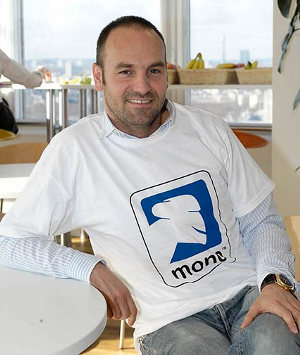06.01.13
Posted in GNU/Linux, Linspire, Microsoft, Ubuntu at 9:58 am by Dr. Roy Schestowitz
Mark Shuttleworth wants us to think Microsoft has changed

Summary: Canonical’s founder is making controversial moves which are helping Microsoft’s PR, such as the nonsense constantly heard from full-time PR staff and moles like Rebellino
UBUNTU used to be a nice project when it was portrayed as “all community” (with branding done accordingly) and some humanitarian cause, as implied by the literal name, “Ubuntu”. I loved Ubuntu when I became an early adopter. I had been told by a colleague (another Ph.D. student called Patrick) that Ubuntu was Debian-based and funded by a man who had visited space. Another colleague of mine, the man who created the first GNU/Linux distribution (MCC) helped me find a copy of Ubuntu 4.10, the first release. Back then it was just an easy-to-install Debian with GNOME loaded by default. It was long before Ubuntu became a branding venture of Mark and his ego trip (not the trip he made to space). I don’t approach this post from a position of hate, only sheer disappointment and a sense of being back-stabbed (betrayal) after sacrificing a lot of my personal life to Ubuntu. I am not alone. Follow reporters privately say the exact same thing.
“The other day Mark crossed out one of his recruitment tools — the promise he would try to make GNU/Linux ubiquitous on the desktop.”The other day Mark crossed out one of his recruitment tools — the promise he would try to make GNU/Linux ubiquitous on the desktop. Many followed his lead, contingent on this philosophical view or implicit promise. But he let us all down. Do not trust opportunist billionaires saying they’re out to get other billionaires. You would be fodder in their Turf Wars. I should have known this even a decade ago.
At the moment, Mr. Shuttleworth seems to be part of that "dick-sucking" contest/competition which Torvalds alluded to. He had been saying a lot of positive things about Microsoft recently, so he turned from pretending to be “against Microsoft” to “working with Microsoft”. What a sellout, what a weak compass of principles. Jono Bacon and his flattery to Microsoft as of late (Microsoft is now a partner) has also been noteworthy. This is like Linspire all over again.
Canonical wants us to think Microsoft monopoly is over, but it is not. Cisco is now complaining about Microsoft monopoly in yet another area. To quote: “The Cisco Systems (CSCO) Jabber vs. Microsoft (MSFT) Skype video conferencing war has pushed beyond product features and functions, and now includes a new word: Monopoly.”
Ubuntu.com was promoting Skype in its front page even after Microsoft had bought it. Skype is insidious spyware after Microsoft changed the infrastructure and put it in the land of the NSA. Here is more on the monopoly allegation; “Last year, Cisco took its case against the Microsoft-Cisco merger to court in Europe. While it didn’t oppose the merger, the networking giant wanted EU regulators to impose rules about “standards-based interoperability.” In a blog post, Cisco VP Marthin De Beer said the very future of video communications was at risk.”
“Canonical wants us to think Microsoft monopoly is over, but it is not.”Never mind other monopolies, eh? The Italian press prints some Microsoft lies from Rebellino, a sort of Microsoft mole whose purpose seems to be seeding puff pieces like this one, printing Microsoft’s lies to portray its actions as ‘open’. Canonical does the same thing now. iophk called it “Microsoft appeasement” and cited this discussion about it. There are many comments there, almost exclusively hostile towards Canonical. Adrian Lopez wrote: “Microsoft is losing market share to tablets and smartphones, but these are shut tighter than the PC platform ever was. I’m not sure that’s something to celebrate.”
With leadership from Microsoft inside Ubuntu, this should not be totally shocking. It is almost like Ubuntu got abducted. The Microsoft booster says Shuttlewoth gave up and in Ubuntu Forums an interesting comment says: “This seems like kind of a missed opportunity. I would have liked to see this bug closed with some fanfare, maybe in conjunction with the announcement of a big OEM deal or somesuch. As it is, it sounds like Mark just sort of said, “oh, yeah, that bug. I guess we can close that now or something.” If anything, the closing and his comments about it reflect less on Ubuntu’s success and more on Canonical’s waning interest in the PC platform.”
The Shuttleworth position can be summarised as follows:
- 2004: come join me, we’ll beat an illegal monopoly together.
- 2013: I’m friends with Microsoft now, never mind that monopoly.
The news got covered even by NPR and some big channels, not just technology sites that offer no criticism. A few years back, Shuttleworth was comparing Microsoft criticism to racism (false and derogatory analogy, akin to him calling his critics "trolls"), showing he was starting to treat Microsoft disdain as the problems An article on this subject by John C. Dvorak, who told me he was exploring Ubuntu, is actually expressing unease at IDG. Dvorak says: “Ubuntu’s maker says Linux will never achieve the goal of overtaking Windows. This because computers—and users—are dumber than ever.”
“If you were tasked with destroying Ubuntu as quickly as possible, you would do more or less what Mark Shuttleworth is doing right now.”This is sarcasm. iophk says “Dvorak is always a bit flamebaitish, but he brings up good points from time to time. In this case his points hit home. However, he forgets about the OEM lock-in.. no-one has gotten past that yet. It could happen but restricted boot makes it harder even at the OEM level.”
If you were tasked with destroying Ubuntu as quickly as possible, you would do more or less what Mark Shuttleworth is doing right now. Pro-Linux sites covered this and Linux expert Sean Michael Kerner chose the headline “Shuttleworth Fixes Ubuntu Linux Bug #1 – But It’s Not Really Fixed Is It?”
As put by Kevin Granade in his reply to me, “setting aside portable devices (irrelevant) and MS being nice now (bullshit), Ubuntu bug #1 isn’t “fixed”, it’s “wontfix”.”
On the closing of bug #1, one person sent me this photo by E-mail. “Microsoft still has a lock on the desktop and via restricted boot is trying to complete it and make it permanent,” he said.
“Is Microsoft extorting Android? Yes, and even Mark cannot deny this.”Recently, Shuttleworth has been aiding criminals rather than fighting them. “The closure comment reads like something agreed to as part of a deal with Microsoft,” iophk told me, thinking whether it is “deal or entryism?”
Steven J. Vaughan-Nichols, a leading GNU/Linux pundit, says “Shuttleworth, a top business Linux leader, praised Microsoft for its support of Linux.”
Carmony #2.
“Of course, I disagree,” Pogson writes. “No thanks, Mark. I will continue the fight as long as I can whether it is convenient to continue or not. Wintel survives on ignorance.”
Here is some more coverage of interest:
-
Of course, “people and distributions do evolve,” Google+ blogger Gonzalo Velasco C. pointed out. “Definitively, Ubuntu is no more than just a ‘friendly Debian.’ But in their quest to become a successful ‘Linux for human beings,’ they (specially guided by Mark Shuttleworth) took a very particular path.”
Specifically, “they have made some concessions, they have sort of imposed some changes to become ‘a huge (commercial) success,’ and we can see where they got,” he added. “Many users (especially the more GNU/Linux FLOSS, community oriented) have left, and many new users seeking something that works and is easy to use have come. C’est la vie.”
-
It’s really worth reminding ourselves of how, in many ways, open source won. True, it’s still hard to walk into a store and buy a PC that doesn’t have Windows preinstalled – one of the key complaints in that original bug report – but, in a way, that doesn’t matter anymore. Microsoft may still dominate the PC market, but what we traditionally think of as a PC is no longer the default personal computer. Heck, these days we even have a market-leading and (largely) open-source browser, in the shape of Chrome, that has become a significant operating system of sorts in its own right.
That’s hogwash.
Let’s recall, putting aside whether GNU/Linux ‘won’ or not, how Shuttleworth used to speak about Microsoft. Two quotes from half a decade ago:
- “That’s extortion and we should call it what it is. To say, as Ballmer did, that there is undisclosed balance sheet liability, that’s just extortion and we should refuse to get drawn into that game.” –Mark Shuttleworth
- “Microsoft is asking people to pay them for patents, but they won’t say which ones. If a guy walks into a shop and says: “It’s an unsafe neighbourhood, why don’t you pay me 20 bucks and I’ll make sure you’re okay,” that’s illegal. It’s racketeering.” –Mark Shuttleworth
Has any of this extortion stopped? No.
Is Microsoft extorting Android? Yes, and even Mark cannot deny this.
So, Mr. Shuttleworth, why have you befriended the Mafia? You are rapidly becoming an advocacy tool for that Mafia. You became what you hated and those who point it out are anything but “trolls” (a term he recurrently uses to describe critics). █
Permalink
 Send this to a friend
Send this to a friend
Posted in Patents at 9:22 am by Dr. Roy Schestowitz

Summary: Why reform addressing patent scope is becoming ever more elusive and who is responsible for this
With software patents in New Zealand not entirely dead yet, some lawyers in the London-based pro-software patents blog try to promote the notion of software patenting, as always. “It all comes out in the wash: New Zealand grapples with computer programs ‘as such’” says the headline. To quote the lawyers’ echo chamber, “[t]his means that a computer program will not be a patentable invention if the sole inventive feature is that it is a computer program, explain Simpson Grierson. It will, though, be possible to obtain a patent for a computer program if the invention’s contribution lies outside of the computer, or if the contribution affects the computer itself but is not dependent on the type of data being processed or the particular application being used.”
Why is this relevant? They lobbied for something similar (“as such”) to enable or facilitate software patents in Europe. It’s becoming a trending topic again. Matthias Kirschner of the FSFE says that “[o]ut of 58 innovations of the most important software innovations only 5 may be subject to patents,” based on a recent paper. He wrote some articles on the subject of software patents recently (those are in German though). He also noted that “#Google gets some more time in the #swpat fight with #Microsoft [link to Microsoft Florian omitted] When will this patent insanity stop?” Maybe when we start identifying where this mess comes from and start getting more active.
Watch another lawyers’ Web site promoting software patents this week, citing David Kappos. They are providing ammunition to overzealous lawyers who keep (even this week) discrediting progress. The microcosm of lawyers continues to discredit those who claim CAFC put software patents in a dark alley, as evidenced here. It is important to recognise that patent lawyers are doing this, knowingly impeding progress.
James Love wrote the other day that “The ideology around patents is so strong that people tolerate extreme inequalities of access to cancer drugs, and access-related deaths.”
These debates are usually dominated by clueless bureaucrats and lawyers (often the same group). Pamela Jones, a paralegal, says that “Finally, Computer Scientists Speak” in the biggest case over Android. She writes: “An amazing collection of the leading computer scientists in the world have joined together to stand with Google and against Oracle in the Oracle v. Google appeal about APIs, and they ask the court to affirm Judge William Alsup’s decision that the Java APIs are not copyrightable. It’s in an amicus brief [PDF] that EFF has just filed.”
Josh Mendelsohn says Public Radio International (PRI) is to “revisit software patents this weekend” in this show, but it seems to involve EFF lawyers who focus on trolls and not software patents like they promised they would. We shall see. We have already criticised the EFF for this. “No mention of the problem patent(s),” says iophk about the latest EFF action (about podcasting). “Also, fighting the patents one at a time is just playing expensive whack-a-mole at $4,000,000 a hit. Better to concentrate the effort on eliminating software patents, that’s a one-time investment, not a subscription activity” (prior to this, the EFF ran the futile patent busting endevaour — a one-by-one effort).
iophk is right. The EFF is just feeding lawyers in a trial and it’s usually lawyers who write for them on this topic, serving as a bit of a distraction.
The real problem with patents is not trolls. Some trolls, such as MPEG-LA, act as a proxy for giants like Apple and Microsoft, doing this for many years despite complaints to the government.
The problem is software patents, which MPEG-LA is all about. To give another infamous example, consider the caller ID patent and its impact. Like podcasting and multimedia patents, it is a software patent.
Lawyers may deliberately lead us down the road of pseudo reform that would achieve too little and legitimise so much of the status quo. Here is another new post which focuses on trolls rather than patent scope. It says: “Retailers are finally fighting back against so-called patent trolls, firms that buy patents and then threaten retailers to get whatever licensing fees they can. These firms generally don’t want to go to court. They’d rather send letters and make a nice living from the checks of chains that can’t be bothered to fight.”
These retails are almost always hit by software patents. The fact that the holders are patent trolls is not so relevant. █
Permalink
 Send this to a friend
Send this to a friend
Posted in DRM, EFF, FSF, Microsoft at 8:40 am by Dr. Roy Schestowitz
Don’t help recover a deprecated business model

Source: Original from John S. and James L. Knight Foundation, modified by Techrights
Summary: Reality check required and some ‘house cleaning’ too amid serious reputation harm to the W3C
Tim Berners-Lee created the World Wide Web to help him, a CERN researcher, share his physics papers. I can relate to that personally. He and I were both inspired by Richard Stallman, who had led a movement a decade earlier, advocating free sharing (free of restrictions, not related to cost or business models). It was not about monetary gain and Berners-Lee antagonised patents all along [1, 2, 3]. Sadly, however, the W3C shares none of those same interests and principles. Recently, it got as bad as DRM advocacy (owing/due to Microsoft and a buddy), which is not shocking given who runs the W3C. I exchanged some words with Berners-Lee about patents. His views contradict those of the increasingly corporations-run W3C, e.g. on patents (the W3C CEO is a software patents proponent and the man behind the Microsoft/Novell patent deal).
The FSF and now the EFF are calling on the W3C to get its head together. So far, the subject has been mostly relegated to daily links, but it can no longer be treated as a low-priority issue. Tim Berners-Lee seems to be ignoring and dismissing the obvious calls from public interest groups. He discredits himself and does himself a disservice here.
“A few decades ago Tim Berners-Lee followed the example of Richard Stallman and now it is Richard Stallman’s group which chastises Berners-Lee’s. “Here is the latest protest against the W3C’s action on DRM and further coverage of the original announcement in some FOSS-oriented news sites. For the W3C to facilitate DRM is like facilitating TiVoisation in GPLv2 or Linux and ‘secure’ boot in UEFI. It leads to bad practices that harm a lot of people.
A few decades ago Tim Berners-Lee followed the example of Richard Stallman and now it is Richard Stallman’s group which chastises Berners-Lee’s. There is something to be learned from all this. Berners-Lee should have power over the group (W3C) he created, it should not be the other way around. █
Permalink
 Send this to a friend
Send this to a friend
Posted in Patents at 8:02 am by Dr. Roy Schestowitz
Rep. Peter DeFazio could do better

Summary: Corporate ‘reform’ rather than a meaningful reform is being pursued by yet more US politicians who are funded by corporations
A new article by Mike Masnick notes that more politicians are floating misguided bills to allegedly fix the US patent issue, usually by focusing on patent holders rather than patent scope [1, 2, 3, 4, 5, 6]. Masnick starts by saying: “Another day, another proposal for patent reform in Congress, once again targeting patent trolls (in part). Already this year, we’ve seen Rep. DeFazio push for fee shifting to make trolls pay legal expenses for bogus lawsuits, Rep. Deutch introduce a bill to force patent trolls to stop hiding anonymously behind shell companies, Senator Schumer seek to make it easier to quickly dump bad patents and Senator Cornyn put a bunch of these ideas together in a bigger anti-troll bill. Most of these have been introduced in the last month or so. We can now add a new proposal from Rep. Bob Goodlatte, head of the House Judiciary Committee, who has released a patent “discussion draft” that includes a number of issues it’s trying to fix.”
“Another day, another proposal for patent reform in Congress, once again targeting patent trolls (in part).”
–Mike MasnickFurther down it says: “The bad news is that the existing proposals could go much, much further, and don’t. There’s nothing like an independent invention defense (or independent development as evidence of obviousness), or any effort to seek out peer review of patent proposals — both of which would cut down on many bad patent trolling shakedowns. Furthermore, having watched the messy debate over the America Invents Act, which went on for about seven years (possibly more, depending on how you count), we saw some good ideas in initial drafts watered down more and more year after year, until the final AIA was effectively useless. If we’re already starting with relatively weak proposals, once they go through the ringer and the pharmaceutical companies (mainly) strip out the parts they don’t like, we may be in for another toothless bill. Hopefully, this is a sequel with a twist ending, and something real and effective can actually become law.”
As one whom I chat with about the patent problem put it: “The fact that the Government is standing up and taking notice of the problem of patent trolls and their patent trolling ways can’t ever be considered a bad thing, but we have to remember that it was, in fact, a government agency (hello, USPTO) that started this whole racket in the first place by issuing poor patents, among other missteps. So to go back to that watering hole and expect a solid solution is just…well, kinda dumb.”
“If large companies like IBM and Microsoft wanted to end software patents, these would be over almost immediately.”The problem is, in my humble opinion, that politicians are out there to serve their sponsors, namely big corporations. We all know that large companies hate patent trolls*, so these distracting so-called ‘reforms’ are only to be expected.
If large companies like IBM and Microsoft wanted to end software patents, these would be over almost immediately. They would pay the right people to rewrite the law, even by proxy (groups like Association for ‘Competitive’ Technology). Speaking of proxies, John Cargile promotes the idea of “commercial open source” (all FOSS can be used commercially), but we know his boss is from Microsoft. █
___
* Patent trolls are small players which do something similar to the large conglomerates with their patent pools and cross-licensing, value-inflating conspiracies. Think Madoff vs. Goldman Sachs for an analogy — same Ponzi schemes/crimes, different scale. One gets jail, another gets bailout from injured/victimised taxpayers. Welcome to politics!
Permalink
 Send this to a friend
Send this to a friend
Posted in Deception, Microsoft at 7:42 am by Dr. Roy Schestowitz
ZDNet is run by a company in Manhattan

Summary: How a big lie about extortion is being spread by gullible (or at worst malicious) writers whom CBS pays to run blogs
Journalism, as per its definition, is dead or dying. It rarely pays to tell the truth. In the age of public relations and perception management [1, 2] we have descended to a state of turmoil where people who ‘report’ are just trying sell us something, usually a brand or an ideology.
Over at ZDNet, a new anti-Android piece titled “Is Android’s market share really a ‘joke’?” represents the old FUD pattern of IDC and Gartner, where money is the only yardstick by which to measure ‘share’.
In the same site we find this whitewashing of Intellectual Ventures (Microsoft’s patent trolls). The trolls are picking on a longtime rival of Microsoft, which was willing to pick up a fight with Microsoft over it [1, 2]. Rachel King is completely ignorant about this, or maybe she is deliberately doing a hogwash piece (which would be even worse as that would be malice, not neglect or incompetence).
“ZDNet’s Rachel King recently wrote about Salesforce.com paying off Intellectual Ventures not to sue it by basically reprinting IV’s press release, to the point of describing IV not for what it actually does, but as a company that “invests in and works with investors and technology businesses to drive innovation and invention.””
–Mike MasnickMike Masnick calls ZDNet “Tech Press”, but this is just a CBS tabloid made out of blogs, many of which are run by Microsoft people (staff, former staff, peripheral staff, etc.) and flamebait artists.
Masnick says: “It appears that Intellectual Ventures, the world’s largest patent troll, is testing out some new hilarious spin concerning its business of shaking down companies who innovate, getting them to pay huge sums of money to avoid getting sued. And, ridiculously, some in the tech press are falling for it. ZDNet’s Rachel King recently wrote about Salesforce.com paying off Intellectual Ventures not to sue it by basically reprinting IV’s press release, to the point of describing IV not for what it actually does, but as a company that “invests in and works with investors and technology businesses to drive innovation and invention.” Of course, if you know anything about Intellectual Ventures (or, hell, do a Google search) you’d quickly learn that what IV does has nothing to do with driving innovation or invention. It buys up crappy patents that are mostly worthless on their own, bundles them together in a big batch and then tells companies to pay up to (a) avoid getting sued and (b) get in on the deal by
letting them use that big batch of patents at times. ”
These are essentially lies published by ZDNet. These lies are entering news feeds.
Tell Google to stop syndicating ZDNet in Google News. Those blogs are rotting people’s brains and helping very mean companies. Wherever possible, avoid linking to ZDNet and attempt to never read it. Your mind will thank you. By reading it you merely feed the monster — the same monster which feeds Bill Gates by reputation laundering, facilitating the looting of a blinded society. █
Permalink
 Send this to a friend
Send this to a friend
Posted in Site News at 7:22 am by Dr. Roy Schestowitz
Critical advocacy definitely hurts the perpetrators

Summary: The net impact of this site and a growing level of respect
WE’RE in a position where we can tell that Boycott Novell probably cost Novell many millions of dollars in lost revenue. The action was phenomenally successful. It took a (personal) toll, but it did help society in many ways.
Some site called “Boycott Apple” (Boycott Apple dot com) is syndicating some posts from Techrights (didn’t know until now). Here is a partial list of posts. This reminds us of the old days when Boycott Novell was used to educate people about Novell and channel them towards other companies.
“Back in the days of activism about Novell we received a lot of flak for criticising what was falsely perceived as part of the ‘Linux world’.”It is not unusual for us to find ourselves impacting news sites; books too are occasionally citing us. For instance, Techrights is cited in this book and this book, where criticism of the Gartner Group got noted (I also participated in a film about this). This is all outside the scope of my academic work which got me in dozens of books. In my view, this site has had a far greater contribution than my academic work, which is why it is approaching its seventh year and seventeen-thousandth post. Yes, it has been that long and this much.
Back in the days of activism about Novell we received a lot of flak for criticising what was falsely perceived as part of the ‘Linux world’. That was before Novell gave its patents to Microsoft and Apple, essentially proving us right. Novell was a ticking time bomb and the patent deals revolutionised by Novell continue to harm Linux to this date. Android in particular is impacted now. █
Permalink
 Send this to a friend
Send this to a friend























 Content is available under CC-BY-SA
Content is available under CC-BY-SA